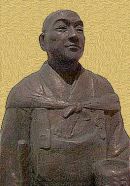
Ryokan
The thief left it behind:
the moon
at my window
Taigu Ryokan (1758-1831) a Zen Master and one of Japan's most beloved literary figures,
known for his great kindness and continual smile. He refused to be honored and never
published his verse while alive. He practiced zazen, took walks in the wood, and was
sustained by takuhatsu(begging). In his presence, people felt "as if spring had come on
a dark winter's day." His most famous haiku (above) was written after a thief entered
his small hut and stole his few possessions.
Ryokan's poetry
Who says my poems are poems?
These poems are not poems.
When you can understand this,
then we can begin to speak of poetry.
Without a bit of ambition left,
I let my nature flow where it will.
There are ten days of rice in my bag
and by the fireplace a bundle of wood.
Who chatters of illusion or nirvana,
forgetting the equal dust of name and fortune,
Listening to the night rain on the roof of my hut,
I sit, at ease, both legs stretched out.
Delusion and enlightenment sustain each other.
Evident causes and secret reasons merge as one.
From morning to dusk I read my wordless text;
Until dawn I give myself to thoughtless meditation.
Spring warblers whistle to me from wind swept willows.
Dogs bark to me from a moonlit village.
No laws define this feeling surging through me.
How can I bequeath a heart so overwhelmed?
In all ten directions of the universe,
there is only one truth.
When we see clearly, the great teachings are the same.
What can ever be lost? What can be attained?
If we attain something, it was there from the beginning of time.
If we lose something, it is hiding somewhere near us.
Look: this ball in my pocket:
can you see how priceless it is?
In stubborn stupidity, I live on alone
befriended by trees and herbs.
Too lazy to learn right from wrong,
I laugh at myself, ignoring others.
Lifting my bony shanks, I cross the stream,
a sack in my hand, blessed by spring weather.
Living thus, I want for nothing,
at peace with all the world.
Your finger points to the moon,
but the finger is blind until the moon appears.
What connection has moon and finger?
Are they separate objects or bound?
This is a question for beginners
wrapped in seas of ignorance.
Yet one who looks beyond metaphor
knows there is no finger; there is no moon.
First days of spring
the sky is bright blue, the sun huge and warm.
Everything is turning green.
I carry my monk’s bowl and walk to the village
to beg for my daily meal.
The children spot me at the temple gate
and happily crowd around,
dragging at my arms till I stop.
I put my bowl on a white rock,
hang my bag on a branch.
First we braid grasses and play tug-of-war,
then we take turns singing and keeping a kick-ball in the air:
I kick the ball and they sing, they kick and I sing.
Time is forgotten, the hours fly.
People passing by point at me and laugh:
“Why are you acting like such a fool?”
I nod my head and don’t answer.
I could say something, but why?
Do you want to know what’s in my heart?
From the beginning of time: just this! just this!
My hut lies in the midst of a dense woods.
Every year the spring ivy grows longer.
No news of men’s affairs;
only the happy songs of the woodcutter.
When the sun comes up, I mend my robes.
When the moon comes out, I read Buddhist poems.
All that I have to report is this:
To arrive at the true way,
stop chasing so many things.
The ancient buddhas taught the Dharma
Not for its own sake but to assist us.
If we really knew ourselves
We would not have to rely on old teachers.
The wise go right to the core
And leap beyond appearances;
The foolish cleave to details
And get ensnared by words and letters.
Such people envy the accomplishments of others
And work feverishly to attain the same things.
Cling to truth and it becomes falsehood;
Understand falsehood and it becomes truth.
Truth and falsehood are two sides of a coin:
Neither accept nor reject either one.
Don't waste your precious time fruitlessly
Trying to gauge the depths of life's ups and downs.
Wild peonies
Now at their peak in
Glorious full bloom.
Too precious to pick.
Too precious not to pick.

Larry Smith and Mei Hui Huang. Their book Chinese Zen Poems: What Hold Has This
Mountain? may be ordered by sending $10 to Bottom Dog Press, c/o Firelands College,
Huron, Ohio 44839. They are completing a book of Ryokan's KANSHI: JOURNAL POEMS
home page
poets list
.
|
|